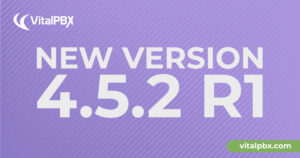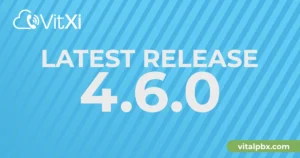Why Smart Companies Are Ditching Traditional Phones in 2025 (And What They’re Using Instead)
Take a look around your office. Amidst the sleek laptops, wireless accessories, and cloud-powered software, does that old desk phone look a little out of place? For a growing number of businesses in 2025, that plastic handset tethered to the wall is more than just outdated—it’s a liability. Smart companies are actively ditching traditional phones, not just for something new, but for something fundamentally better.
This isn’t a simple hardware refresh; it’s a strategic shift in how businesses operate, communicate, and grow. The old way of staying connected, built on copper wires and on-premise hardware closets, simply can’t keep up with the demands of a modern, agile, and often remote workforce. So, what are they embracing instead? A world of flexible, powerful, and cost-effective communication platforms that live in the cloud. Let’s explore why the days of the traditional PBX are numbered and what the future of business voice looks like.
The Writing on the Wall: Why Traditional Phones are Holding Businesses Back
The decision to move away from legacy phone systems isn’t just about chasing the latest trend. It’s a response to the very real limitations and frustrations that these outdated systems impose on a modern business. They have become anchors weighing down companies that need to be fast and flexible.
The Anchor of High Costs and Hidden Fees
Traditional phone systems, often called Private Branch Exchange (PBX) systems, are notoriously expensive. The initial investment includes bulky on-premise hardware, complex installation, and a bundle of physical phones. But the costs don’t stop there. Maintenance contracts are often required to keep the system running, and any changes, like adding a new employee or phone line, usually involve a costly visit from a specialized technician. These unpredictable expenses make budgeting a nightmare.
Chained to the Desk: The Lack of Mobility and Flexibility
Perhaps the biggest drawback of a traditional phone system in our post-pandemic world is its complete lack of mobility. Your business number is tied to a specific physical phone at a specific desk. In an age where remote and hybrid work is the norm, this is a critical failure. Forwarding calls to a mobile is a clunky workaround at best, and it doesn’t provide employees with the professional tools they need to work effectively from anywhere. This inflexibility stifles productivity and limits your talent pool to a specific geographic area.
A Feature Desert: Limited Functionality in a Digital World
Compared to their modern counterparts, traditional phone systems are a feature desert. They were built for one purpose: making and receiving calls. Modern business, however, demands more. Features that are now considered standard—like video conferencing, instant messaging, advanced call routing, and CRM integrations—are either impossible or prohibitively expensive to add to an old PBX system. You’re stuck with basic functionality while your competitors leverage a full suite of communication tools.
The Scalability Nightmare
What happens when your business grows? With a traditional system, scaling up is a slow, expensive, and disruptive process. It often means buying more hardware, installing new phone lines, and extensive reprogramming. Conversely, if you need to scale down, you’re often stuck paying for lines and hardware you no longer use. This lack of agility prevents businesses from adapting quickly to changing market conditions.
The Modern Communication Revolution: What’s Replacing the Desk Phone?
The good news is that the solution is not only superior but also more accessible than ever. The technology replacing traditional phones is built on the power of the internet, offering unparalleled flexibility and features. This is the new landscape of business communication.
Introducing VoIP: The Foundation of Modern Voice
Voice over Internet Protocol (VoIP) is the foundational technology behind the shift. Instead of using old copper phone lines, VoIP transmits voice calls as digital data over your existing internet connection. This simple change unlocks a world of possibilities. As long as you have an internet connection, you can have your business phone system. To learn more about the technology, you can dive into Understanding VoIP and How It Works.
Cloud PBX: Your Phone System, Anywhere
A Cloud PBX (or Hosted PBX) takes the brains of a traditional phone system and moves it to a secure, off-site data center. This eliminates the need for a clunky hardware closet in your office. Your entire phone system is managed through a simple web interface, allowing you to add users, change call routing, and monitor activity from anywhere in the world. This is the key to unlocking true business mobility.
The Ultimate Upgrade: Unified Communications as a Service (UCaaS)
UCaaS is the pinnacle of modern business communication. It takes a Cloud PBX and integrates it with a full suite of other communication tools into a single, seamless platform. This means your business gets:
- Voice and Video Calling: High-definition calls and video conferences from any device.
- Instant Messaging: Real-time team chat and collaboration.
- Presence Information: See who is available, busy, or away at a glance.
- File Sharing: Securely share documents within your communication hub.
- Integrations: Connect your phone system with tools like Salesforce, Zendesk, or Microsoft 365.
Platforms like VitalPBX bring all these UCaaS features together, transforming your communication from a simple utility into a powerful business asset. Deciding on the right platform is a crucial step, and understanding the differences between models like UCaaS vs CPaaS can help you make an informed choice.
Unlocking a World of Possibilities: Key Features of Modern Phone Systems
Switching from a traditional system to a modern platform like VitalPBX isn’t just about saving money or enabling remote work. It’s about equipping your team with tools that drive efficiency, improve customer service, and provide a competitive edge.
Unprecedented Mobility with Softphones and Mobile Apps
With a modern system, your business number is no longer tied to a desk. Employees can make and receive calls from their business line using a “softphone” application on their computer or a dedicated app on their smartphone. They have access to the full company directory, call history, and voicemail from anywhere, presenting a professional and unified front to clients no matter where they are working.
Advanced Calling Features that Drive Business Intelligence
Modern VoIP and UCaaS platforms come packed with powerful features that were once reserved for enterprise-level call centers. These include:
- Interactive Voice Response (IVR): Create professional “press 1 for sales, press 2 for support” menus to direct callers efficiently.
- Advanced Call Queues: Manage high call volumes intelligently, reducing hold times and improving customer satisfaction.
- Call Recording: A vital tool for training, quality assurance, and dispute resolution.
- Real-time Analytics: Gain valuable insights into call patterns, peak hours, and team performance through detailed reporting dashboards.
Seamless Integration with Your Existing Business Tools
One of the most powerful aspects of modern communication systems is their ability to integrate with the other software that runs your business. Imagine a customer calls, and a screen-pop automatically shows your agent their entire history from your CRM before they even say hello. This level of integration streamlines workflows, eliminates manual data entry, and allows for a far more personalized customer experience.
Predictable Costs and Superior Return on Investment (ROI)
Cloud-based phone systems typically operate on a predictable, per-user, per-month subscription model. This eliminates surprise maintenance bills and large capital expenditures, making it easy to budget for. According to a report from Gartner, organizations can see significant cost savings by migrating to a UCaaS platform. When you factor in the massive gains in productivity, flexibility, and customer service, the ROI becomes undeniable. Making the choice between On-Premise vs. Cloud PBX is a key strategic decision that directly impacts this ROI.
Frequently Asked Questions (FAQ)
What is actually replacing traditional business landlines?
The primary replacement is VoIP (Voice over Internet Protocol) technology, which is delivered through platforms like Cloud PBX and Unified Communications as a Service (UCaaS). These systems use the internet to provide more features, flexibility, and cost-effectiveness than old analog phone lines.
Is VoIP really cheaper than a traditional phone system?
Yes, for the vast majority of businesses. VoIP eliminates the need for expensive on-premise hardware, separate maintenance contracts, and charges from the phone company for individual lines. The subscription-based model is typically more affordable and predictable, especially when you factor in the inclusion of long-distance and international calls in many plans.
Can I keep my existing business phone number if I switch?
Absolutely. The process is called “number porting,” and it’s a standard procedure regulated by the FCC. You can move your existing, established business numbers to a new VoIP provider like VitalPBX, ensuring a seamless transition for your customers.
How secure are modern cloud-based phone systems?
Reputable providers invest heavily in security. Modern systems use advanced encryption protocols like TLS and SRTP to protect your calls from eavesdropping. Hosted solutions in secure data centers often provide a higher level of security and redundancy than a business could afford for an on-premise system.
The Future is Calling: It’s Time to Answer
The transition away from traditional phone systems is no longer a question of “if,” but “when.” In 2025, clinging to an outdated, inflexible, and expensive PBX system is a strategic disadvantage. It restricts your growth, hampers your team’s productivity, and fails to meet the expectations of modern customers.
Smart companies are embracing the change, not just as a technological upgrade, but as a fundamental improvement to their business operations. By moving to a unified, cloud-based communication platform, they are building a more agile, efficient, and resilient organization. This is your opportunity to empower your team with the tools they need to succeed in a work-from-anywhere world.
Ready to cut the cord and discover what a modern communication system can do for your business?
Download VitalPBX today and experience the future of business communication firsthand. Try our powerful, flexible, and scalable platform and see why it’s the smart choice for companies leaving their old phones behind.




